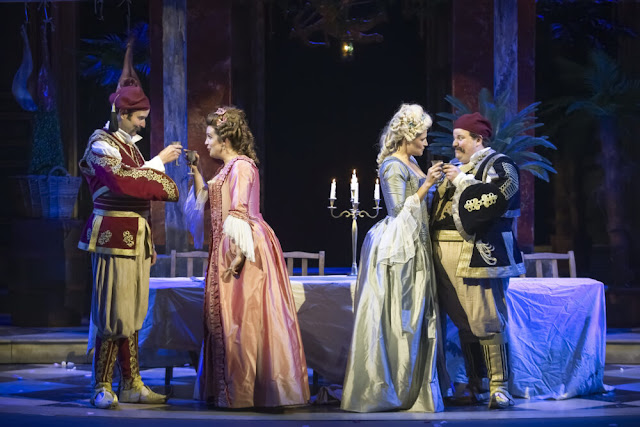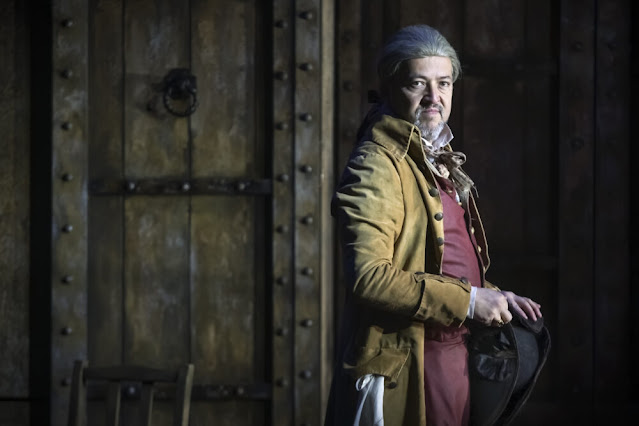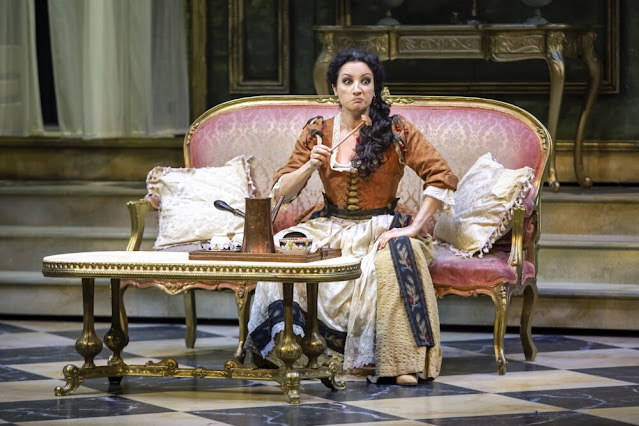 |
| Mozart: Cosi fan tutte - Nicholas Lester, Kitty Whately, Samantha Clarke, Alessandro Fisher - The Grange Festival (Photo Craig Fuller) |
Mozart: Cosi fan tutte; Samantha Clarke, Kitty Whately, Alessandro Fisher, Nicholas Lester, Carolina Lippo, Christian Senn, director: Martin Lloyd-Evans, Bournemouth Symphony Orchestra, conductor: Kirill Karabits
An intelligent period production that engages as well as questions, with a wonderfully balanced cast and superb support from the pit. All in all, a very stylish evening
Directors tend to try and shed new light on an established classic by altering the location, either transposing it into a different, usually more recent, era or providing something semi-abstract, avoiding historicism and focusing on character. The problem with setting operas in their intended historical period is that the period detail can act as a smoke screen hiding the emotional content, we come away admiring the costumes and singing the sets.
For Mozart's Cosi fan tutte at The Grange Festival (seen 18 June 2023), director Martin Lloyd-Evans and designer Dick Bird decided to use the original setting to interrogate what the opera's time and location would mean to people of the time. We thus got a production which was not only in 18th-century costume but was full of detail and incident pointing to the location too, Naples.
 |
| Mozart: Cosi fan tutte - Christian Senn - The Grange Festival (Photo Craig Fuller) |
Kirill Karabits, making his festival debut, conducted the Bournemouth Symphony Orchestra, with harpsichord continuo from Peter Davies. Samantha Clarke and Kitty Whately were the sisters, Fiordiligi and Dorabella, with Alessandro Fisher and Nicholas Lester as their lovers, Ferrando and Guglielmo. Carolina Lippo was Despina and Christian Senn was Don Alfonso.
During a stylish account of the overture that boded well for the remainder of the opera, we saw a street in Naples. Full of character and incident, this was evidently a brothel patronised by Don Alfonso (Christian Senn), Ferrando (Alessandro Fisher) and Guglielmo (Nicholas Lester). From the outset, it was clear that Martin Lloyd-Evans' solution to the work's problematic title was to add a corollary, 'Men are like that too!'. The opera's first scene took place outside the brothel and you felt that the two young men were already spending their winning on whores.
But the Neapolitan setting did not just provide licence for the men; Naples and its reputation also allowed women to loosen the stays of convention somewhat. This is what happened to the two sisters in Act Two, albeit with the help of copious amounts of alcohol in another delightful scene outside the brothel but this time with Despina (Carolina Lippo) and the sisters.
Lloyd-Evans' approach to the dilemma as to whether or not the opera is a comedy was to make it more of a comedy that goes wrong. Act One was definitely comic, though as in the best comedies, the characters were drawn with utter seriousness. For the two sisters, this was real, but the two male lovers were having the time of their lives and throughout Act One it was clear that neither Fisher's Ferrando nor Lester's Guglielmo took their masquerade at all seriously. This was part of the fun.
There are indications that for an early version of the opera, Mozart and Da Ponte considered having the lovers in disguise each wooing their own beloved. This is what happened in Act One of Lloyd-Evans' production, each of the young men gravitated towards his own beloved. But in Act Two, the sisters chose the opposite man, and from this moment everything unravelled, feelings were hurt and people got angry. The ending remained true to this, there was no easy resolution and all six people involved seem to have come away from the charade rather damaged.
 |
| Mozart: Cosi fan tutte - Carolina Lippo - The Grange Festival (Photo Craig Fuller) |
Dick Bird's set was wonderfully inventive. A single structure on a revolve, the outside was the frontage of the brothel but transformed into the balconied façade of the sisters' villa, whilst the inside was the interior of the villa and transformed into a garden loggia in Act Two. Each scene had its own distinct character, full of telling detail, yet the transformations from one scene to another were completely fluid.
Samantha Clarke and Kitty Whately made a delightful and highly believable pair of sisters. Much of the joy of this performance came from Clarke and Whately's interactions, the way they told the story via little looks and telling intimate detail. Clarke is a lyric soprano who counts Adina (Donizetti's L'elisir d'amore, we caught her last year at West Green, see my review) and Violetta (La traviata) in her repertoire, but she was fully equal to the rigours of Fiordiligi's arias and what was admirable was the way that though 'Come scoglio' was sung entirely seriously and with great style, it was clear that by writing this type of aria and this point in the opera Mozart was also making a comic point. In Act Two, Clarke made Fiordiligi's capitulation rather moving and also troubling, it was clear that the act disturb the young woman and things would never be the same.
Kitty Whately is an experienced Dorabella (we caught her in the role at Opera Holland Park in 2018, with Nicholas Lester as Guglielmo, see my review) but there was nothing routine about her performance. There was a wonderful freshness about how Whately drew Dorabella's volatility, which came over in her two arias. Yet, there was no easy depiction of Dorabella as the lively one and Fiordiligi as the serious one, here the two sisters played off each other delightfully. And you sensed that this Dorabella really fell for the disguised Guglielmo, their duet in the second scene of Act Two was touching and at the end Whately's Dorabella was bewildered and angry.
 |
| Mozart: Cosi fan tutte - Kitty Whately, Samantha Clarke - The Grange Festival (Photo Craig Fuller) |
The two men's relationship was as well drawn as that of the sisters', with Fisher and Lester forming a superb double act, notably in Act One where the two seemed to be having the time of their lives. Fisher and Lester created a real sense of the easy camaraderie between these two young men, both officers, each in love with a sister.
Alessandro Fisher brought wonderful honeyed tone and elegant line to Ferrando's arias, notably 'Un'aura amorosa', but he was also a gifted comic, making this Ferrando rather more intriguing than usual. Prepared to send himself up in Act One, he veered towards real anger when learning of his beloved's seduction by his friend, and approached the seduction of Fiordiligi with complete seriousness.
Nicholas Lester made Guglielmo's journey from easy fun and frolics to anger and bitterness all too believable. His first aria was wonderfully swaggering, but his gloating in the second of course got its comeuppance, and Lester drew Guglielmo's change finely, as well as being positively nasty to Whately's Dorabella at the end.
Carolina Lippo's characterful Despina was youthfully engaging, her arias sung with zest and her expressive eyes doing a wonderful amount of work. This Despina saw the foursome's antics as harmless fun, yet another set of visitors letting their hair down in Naples, but the way Lippo drew the character pulled us in and won our sympathies. Christian Senn's Don Alfonso went a long way in drawing our sympathy too, thanks to his engaging asides direct to the audience. This Don Alfonso was not obviously cynical at first, and only gradually did the full extent of his manipulations count. This Don Alfonso and Despina were definitely not equals, Lippo's Despina clearly being subservient to Don Alfonso as much as the sisters.
 |
| Mozart: Cosi fan tutte - Samantha Clarke, Alessandro Fisher, Carolina Lippo, Nicholas Lester, Kitty Whately, - The Grange Festival (Photo Craig Fuller) |
As well as singing the two choruses, members of the chorus were active throughout the opera providing plenty of local colour from the madam and her whores to itinerant sellers.
In the pit, Kirill Karabits proved himself a fine Mozart stylist and drew from the orchestra playing that was admirably stylish yet also lithe, with suggestions of historically informed influences so that the result was elegant, expressive and vivid. Karabits is standing down as conductor of the Bournemouth Symphony Orchestra, but I do hope he can be tempted back to The Grange.
Never miss out on future posts by following us
The blog is free, but I'd be delighted if you were to show your appreciation by buying me a coffee.
Elsewhere on this blog
- Rückert lieder: Ian Bostridge and Julius Drake in songs by Robert & Clara Schumann, Schubert, Henze and Mahler - concert review
- We simply forget that there was anything young artist about the evening: Hansel & Gretel at Opera Holland Park - opera review
- Colour, text & character: Dresden Music Festival launches its historically informed Ring cycle -with gripping Das Rheingold - opera review
- A little bit of magic: Asya Fateyeva and Lautten Compagney Berlin at the Dresden Music Festival - concert review
- Mozart's late masterpiece: La Clemenza di Tito from Chelsea Opera Group with Helena Dix and Kezia Bienek - opera review
- Verdi's Rigoletto: Opera Holland Park's opening production for 2023 with Elgan Llyr Thomas as the Duke - opera review
- Simplicity is one of the hardest things to do: composer Debbie Wiseman on the challenges of writing music and introducing her new disc, Signature - interview
- Ida revealed: John Wilson & the Orchestra of the Age of Enlightenment take a fresh look at Gilbert & Sullivan's unjustly neglected opera, Princess Ida - opera review
- Terrific and intensely atmospheric: the String Quartet No. 1 and Piano Quintet by Olli Mustonen from the Engegård Quartet and the composer on LAWO Classics - record review
- Because: in a slightly unlikely but completely seductive pairing, countertenor Reginald Mobley is joined by jazz pianist/composer Baptiste Trotignon - record review
- Dennis & Gnasher: Unleashed at the Orchestra: A more than enjoyable event celebrating The Beano with Colin Currie and the BBC Concert Orchestra - concert review
- Home











No comments:
Post a Comment